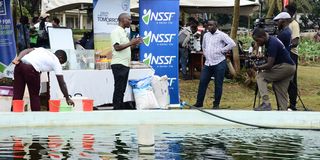Embrace commercial fish farming - Naro

NTV crew cover the proceeding of the virtual Seeds of Gold Farm Clinic from MuZardi, Ntaawo on Saturday. PHOTO/ George Katongole
What you need to know:
- The National Fisheries Resources Research Institute (NaFIRRI) centres at Kajjansi and Jinja, are embarking on efforts to add value as well as studying the possibility of how local fish breeds can be made commercially viable.
The National Agricultural Research Organisation (Naro) has indicated that Uganda’s production deficit and potential can only be met through fish farms.
Mr Andrew Izaara, a senior research officer in aquaculture at the Mukono Zonal Agricultural Research and Development Institute (MuZardi), said Uganda has a deficit of 1.13 metric tonnes which must be covered by 2030.
While making a presentation on commercial farming at the first Seeds of Gold Farm Clinic at MuZardi at Ntaawo Station at the weekend, Mr Izaara said 120,000 metric tonnes, which are currently produced in fish farms, are too low.
“This implies that we need to increase our production by about 300 per cent. You cannot increase that fish by looking at the fish coming out of the lake. We have to increase it by growing it,” Mr Izaara said.
Although the country has a consumption deficit of 600 metric tonnes, the export market, which contributes about 30 per cent of the total production, takes up 30 metric tonnes, fetching in excess of $270m.
Mr Izaara said proper feeding, quality seed and good agronomic practices are necessary for a profitable commercial fish farming .
“Fish farming is an expensive venture to start but it can be profitable with proper practices and proper planning,” he said.
The National Fisheries Resources Research Institute (NaFIRRI) centres at Kajjansi and Jinja, are embarking on efforts to add value as well as studying the possibility of how local fish breeds can be made commercially viable.
The institute exhibited Barbus fish, locally known as Kisingya, which is understood to be a viable substitute to tilapia, the most commonly farmed fish. The other is Catfish.
Among the efforts is the production of the Black Soldier fly as a replacement for mukene (silver fish) in animal feeds.
The two-pronged event, which also highlighted coffee farming, explored how coffee production can be optimised with focus on value addition.
Dr Godfrey Kagezi, the senior research officer at the National Coffee Research Institute (NaCORI), Kituuza, stressed the importance of pruning, stumping and keeping shambas disease-free.
The farm clinic was covered live on NTV and their Social Media handles to thousands of keen farmers due to the coronavirus outbreak.
While marking the World Food Day on October 16, the United Nations advised countries to adopt innovative solutions based on scientific evidence so that they can build back better and improve food systems after the Covid-19 effects.
A May to June survey by Twaweza, a non-governmental organisation, found that half of the households (48 per cent) in the country did not have enough food to take them for more than a week, indicating food insecurity.
With farming increasingly becoming necessary due to urbanisation, platinum sponsors of the event, Stanbic Bank Uganda stressed the role of financing. “Farmers need all the help they can get in order to meet their goals. As Stanbic Bank, we are willing to offer appropriate solutions through agricultural financing,” said Ms Melissa Nyakwera, the head of Agribusiness at Stanbic Bank.
Ms Claire Ichumar, the relations manager at National Social Security Fund, encouraged farmers to take up voluntary saving schemes for happy retirement.
Ms Elizabeth Namaganda, the head of marketing at Nation Media Group Uganda, was excited about the success of the project.



